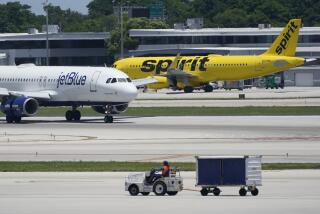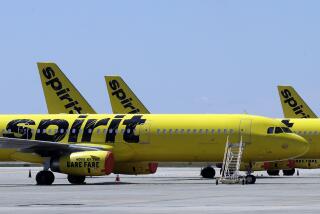Moratorium Placed on Railroad Mergers
- Share via
WASHINGTON — The Surface Transportation Board Friday ordered a 15-month moratorium on all railroad mergers, responding to complaints from major industries and members of Congress that further consolidation in the industry could essentially end competition.
The order, which effectively blocks the proposed combination of the Burlington Northern Santa Fe and Canadian National railroads, makes the railroad business a rare exception to the merger mania sweeping many other major industries.
During the 15-month breathing period, the board said it would rewrite its merger rules, perhaps changing the way the board deals with the broader effects of mergers on the economy, small railroads, customer service, labor and other issues.
The board’s ruling appears destined for a court battle. Under current rules, the BNSF-CN merger application could have been officially filed as early as Monday, and the board then would have had 16 months to reach a decision. The decision was timed to block filing of the BNSF-CN merger application.
CN Chairman Paul Tellier said his railroad will appeal the decision because there’s “no justification” for it. Robert Krebs, chairman of BNSF, said he was “extremely disappointed” and is also exploring court action.
“If the STB action survives judicial review, the result of the STB decision is to penalize BNSF and CN, the two major North American railroads who are taking care of their customers, because of the failures of other railroads whose mergers have resulted in debilitating and costly service failures for shippers,” Krebs said.
Board Chairman Linda Morgan said the decision was “one of the most difficult” she has made in her time on the board and its predecessor, the Interstate Commerce Commission. “But the current problems facing the rail sector are so extraordinary that an unprecedented response is necessary.”
The last two rail consolidations made “merger” a four-letter word for shippers. Union Pacific’s takeover of Southern Pacific in 1996 led to a service “meltdown” that closed some plants briefly in the West and raised shipper costs. Richmond-based CSX Corp. and Norfolk, Va.-based Norfolk Southern Corp. are still in the throes of service problems after they split Conrail between them last year.
The board ruling was a clear victory for the Union Pacific, Norfolk Southern and CSX railroads, whose chairmen warned that the BNSF-CN merger would shift management attention from improved service to developing strategy on how to respond, possibly by further industry consolidation.
Major shippers, such as United Parcel Service and General Motors, as well as small shippers and “short-line” railroads, complained at four days of board hearings earlier this month that service has deteriorated and their freight bills have risen millions of dollars as they move some freight to more costly trucks and suffer plant disruptions.
Over the last decade, railroads have attracted a lot of freight that once moved on the highway. UPS, for example, is the single largest railroad shipper in the country. And almost all new automobiles now move by rail except for local delivery.
UPS and GM, like other shippers, testified that they cannot return to the highway because there are no longer enough trucks and truck drivers, highway capacity or money to pay the extra costs.
More to Read
Sign up for Essential California
The most important California stories and recommendations in your inbox every morning.
You may occasionally receive promotional content from the Los Angeles Times.













